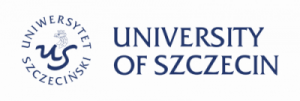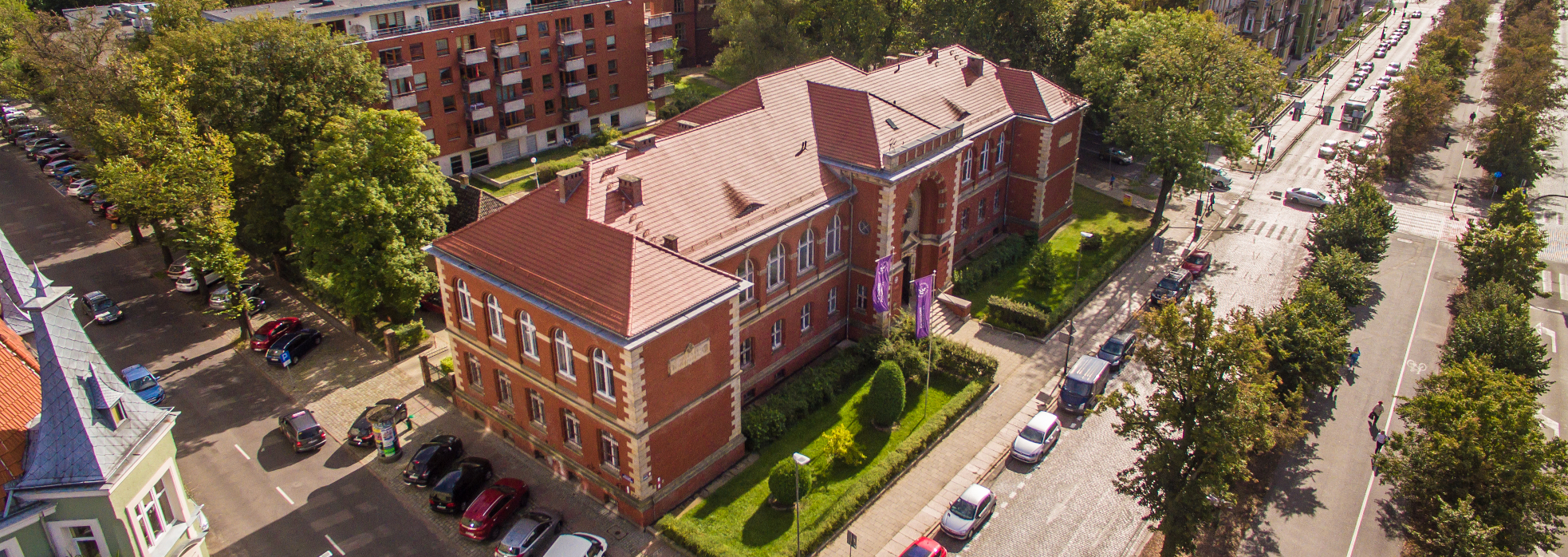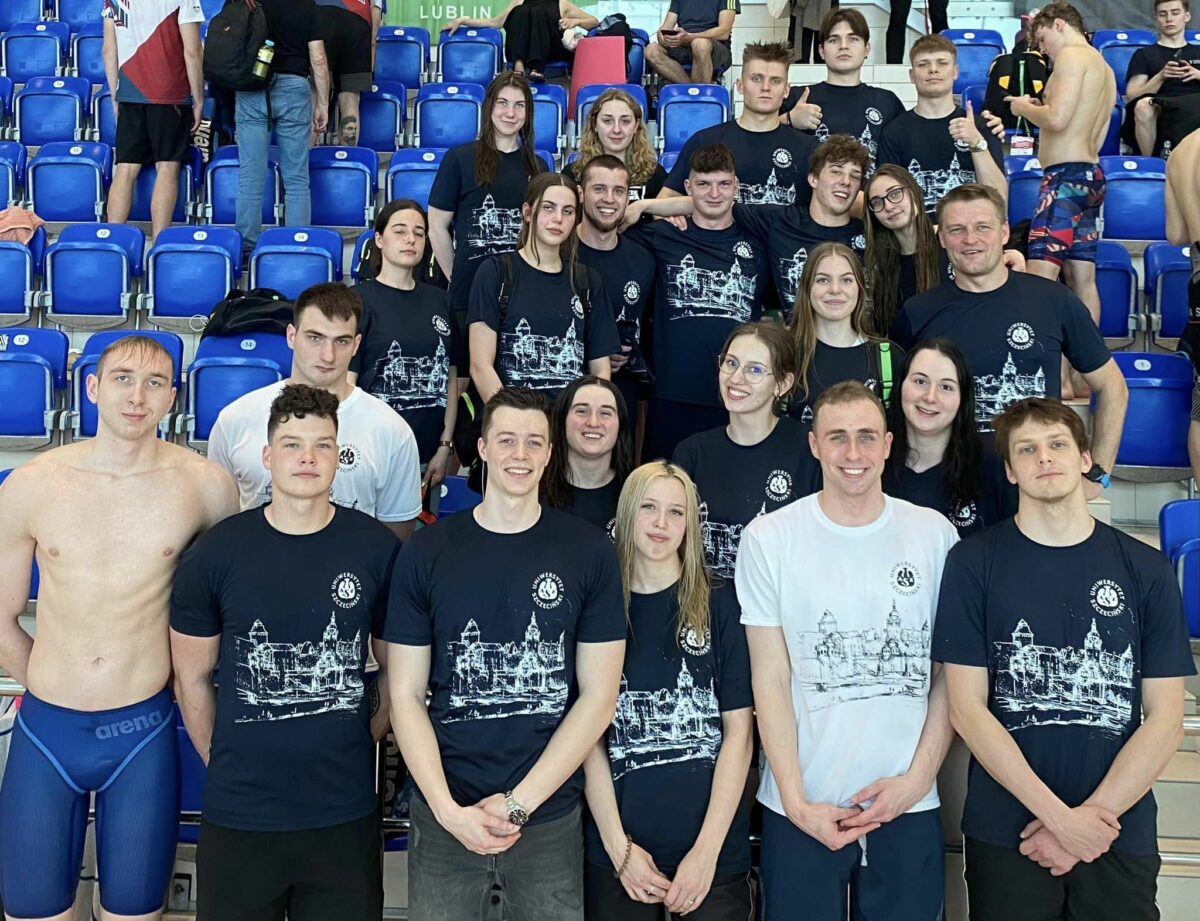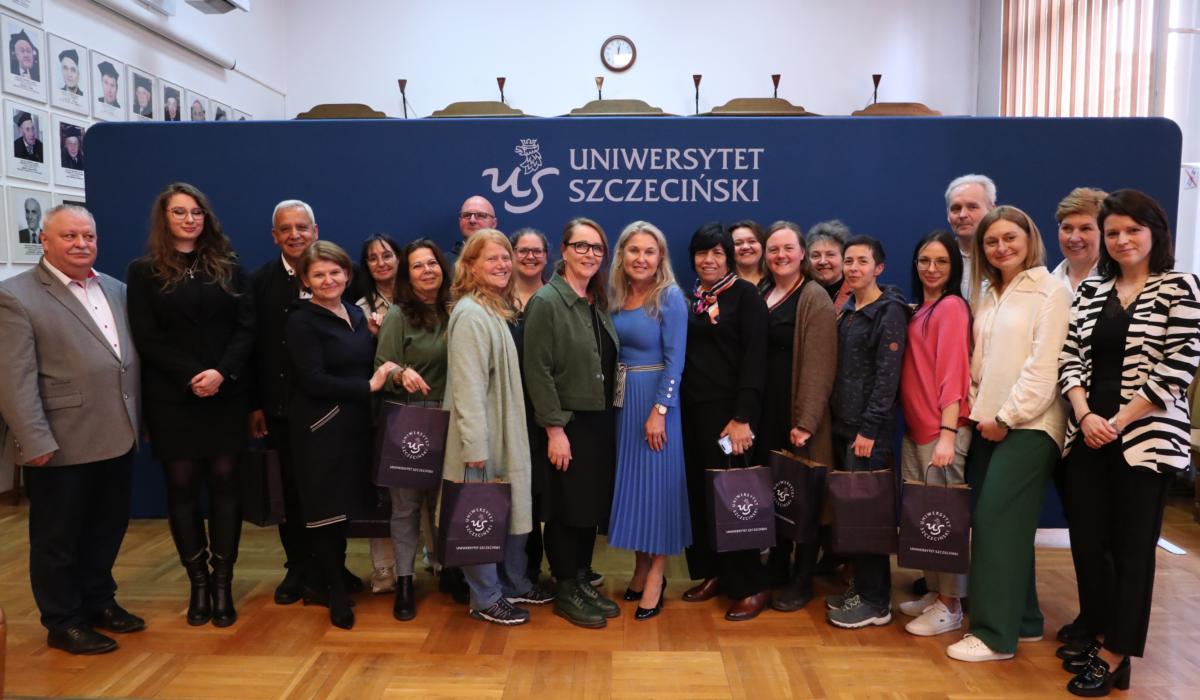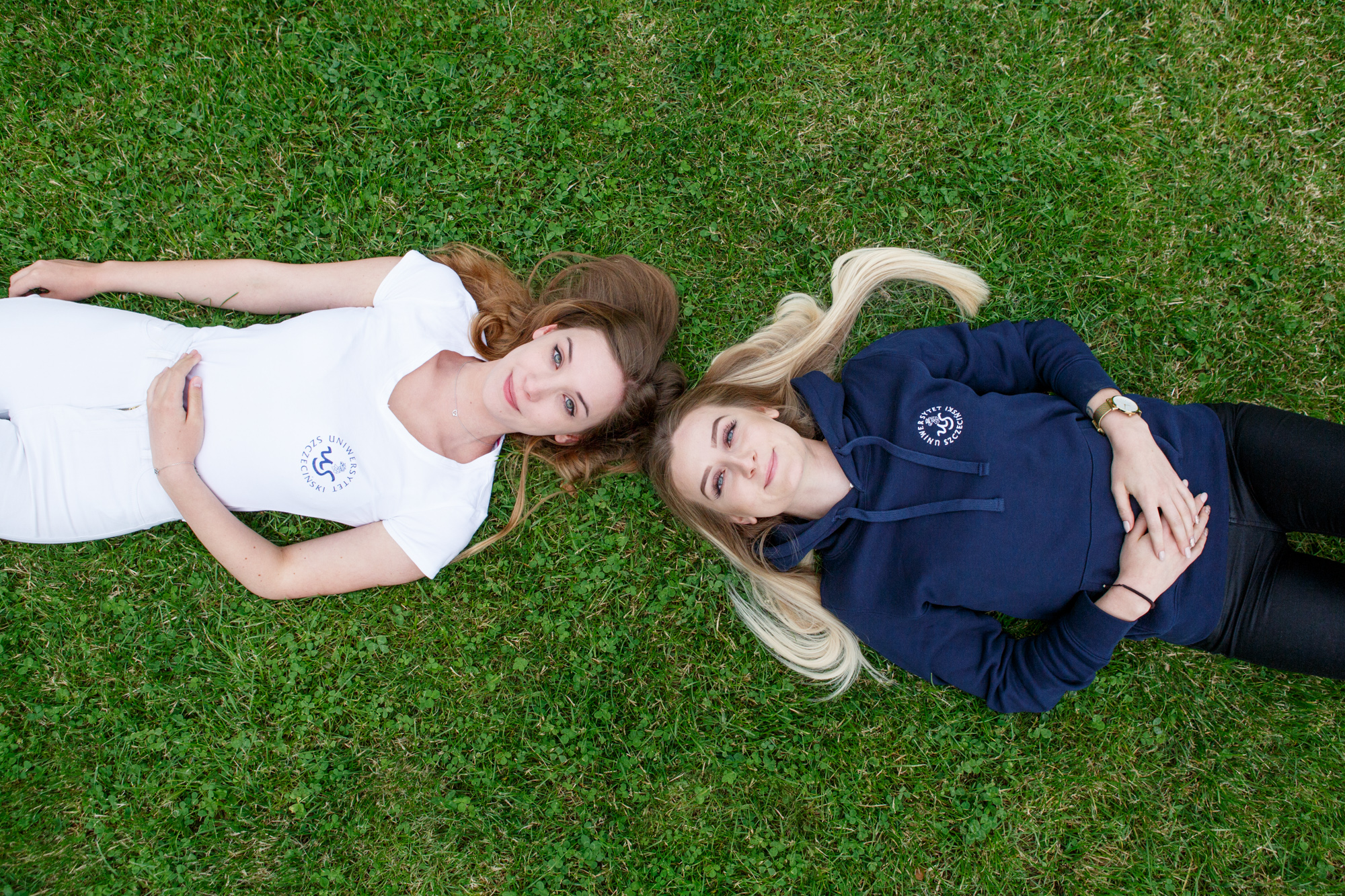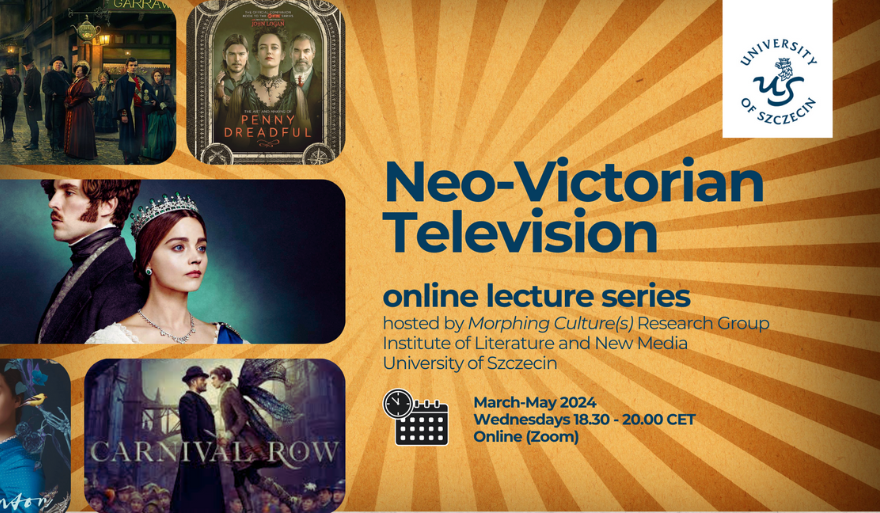Institute of Management started its activity on October 1, 2019, and is one of 18 institutes at the University of Szczecin, whose staff conducts classes for students of Management, Business Informatics, Logistics, Engineering Logistics, Enterprise and Investment and Public Management. Institute of Management has full powers to award degrees and titles in the discipline of management and quality science.
The Institute carries out research focused mainly but not limited to management, marketing, logistics, transport, IT, methods of supporting the decision-making process, modeling and simulating business processes, Big Data, design and analysis of logistic systems, application of IT in logistics, infrastructure of logistic processes, electromobility, energy management, freight and passenger transport market.

Find out more
-
Our Staff
Konrad Bachanek, Msc Eng
Dr Karolina Beyer
Dr Anna Bielawa
Konrad Biercewicz, Msc Eng
Assoc. Prof. Krzysztof Błoński
Damian Bonk, Msc Eng
Dr Anna Borawska
Assoc. Prof. Eng. Mariusz Borawski, Prof. of the University of Szczecin
Bartosz Brożyński, Msc
Assoc. Prof. Augustyna Burlita, Prof. of the University of Szczecin
Dr Urszula Chrąchol-Barczyk
Dr Barbara Czerniachowicz
Jakub Dowejko, MSc
Assoc. Prof. Wojciech Downar, Prof. of the University of Szczecin
Prof. Zygmunt Drążek
Dr Karolina Drela
Dr Eng. Arkadiusz Drewnowski
Dr Joanna Drobiazgiewicz
Assoc. Prof. Wojciech Drozdz, Prof. of the University of Szczecin
Dr Eng. Jarosław Duda
Agata Dziakowicz-Grudzień, MSc
Assoc. Prof. Marzena Frankowska, Prof. of the University of Szczecin
Prof. Ewa Frąckiewicz
Assoc. Prof. Katarzyna Gadomska-Lila, Prof. of the University of Szczecin
Mateusz Gil, MSc
Dr Agnieszka Gozdek
Dr Eng. Piotr Gutowski
Assoc. Prof. Krzysztof Janasz, Prof. of the University of Szczecin
Assoc. Prof. Wojciech Jarecki, Prof. of the University of Szczecin
Jarosław Jaworski, MSc
Dr Katarzyna Kazojć
Jordan Klimek, MSc
Julia Klimek, MSc
Dr Zuzanna Kłos-Adamkiewicz
Dr Magdalena Kogut-Jaworska
Dr Tomasz Komorowski
Marcin Kopiczko, MSc Eng.
Assoc. Prof. Jarosław Korpysa, Prof. of the University of Szczecin
Dr Magdalena Kotnis
Dr Magdalena Kowalska
Sylwia Kowalska, MScAssoc. Prof. Katarzyna Kozioł-Nadolna, Prof. of the University of Szczecin
Assoc. Prof. Ewa Krok
Dr Barbara Królikowska
Dr Emilia Kuciaba
Assoc. Prof. Karol Kuczera
Dr Artur Kulpa
Assoc. Prof. Marek Kunasz, Prof. of the University of Szczecin
Dr Agnieszka Kwarcińska
Assoc. Prof. Tomasz Kwarciński, Prof. of the University of Szczecin
Dr Wojciech Leoński
Assoc. Prof. Eng. Alberto Lozano-Platonoff, Prof. of the University of Szczecin
Assoc. Prof. Małgorzata Łatuszyńska, Prof. of the University of Szczecin
Dr Magdalena Ławicka
Dr Katarzyna Łobacz
Dr Eng. Magdalena Malinowska
Dr Agnieszka Malkowska
Dr Marta Mańkowska
Dr Jerzy Marcinkiewicz
Dr Joanna Markiewicz
Dr Marcin Mastalerz
Assoc. Prof. Ewa Mazur-Wierzbicka, Prof. of the University of Szczecin
Paweł Miązek, MSc
Assoc. Prof. Dariusz Milewski, Prof. of the University of Szczecin
Agnieszka Miluniec, MSc
Dr Sandra Misiak – Kwit
Dr Marta Młokosiewicz
Oliwia Mróz-Malik, MSc Eng.
Dr Karolina Muszyńska
Justyna Myszak, MSc Eng.
Tomasz Naprawski, MSc
Prof. Eng. Kesra Nermend
Prof. Piotr Niedzielski
Piotr Niemcewicz, MSc Eng.
Dr Michał Nowakowski
Dr Piotr Ogonowski
Dr Hubert Pachciarek
Assoc. Prof. Adam Pawlicz
Prof. Józef Perenc
Dr Bartosz PileckiDr Olga Pilipczuk
Dr Mateusz Piwowarski
Assoc. Prof. Michał Pluciński, Prof. of the University of Szczecin
Assoc. Prof. Anna Pluta, Prof. of the University of Szczecin
Agnieszka Pokorska, MSc
Dr Artur Pomianowski
Dr Jarosław Poteralski
Ewa Puzio, MSc
Dr Marcin Rabe
Dr Aleksandra Rudawska
Prof. Edyta Rudawska
Dr Adam Rudawski, Prof. of the University of Szczecin.
Dr Andrzej Rzeczycki
Dr Joanna Rzempała
Dr Marta Sidorkiewicz
Dr Małgorzata Skweres-Kuchta
Dr Kamila Słupińska
Dr Agnieszka Smalec
Małgorzata Smolska, MSc
Dr Aneta Sokół
Dr Hanna Soroka-Potrzebna
Dr Eng. Mariusz Sowa
Dr Monika Spychalska-Wojtkiewicz
Assoc. Prof. Jakub Swacha, Prof. of the University of Szczecin
Malwina Szarek, MSc
Dr Malwina Szczepkowska
Assoc. Prof. Katarzyna Szopik-Depczyńska
Dr Anna Szwajlik
Dr Grzegorz Szyjewski
Prof. Zdzisław Szyjewski
Dr Rafał Szymański
Assoc. Prof. Anna Tokarz-Kocik, Prof. of the University of Szczecin
Dr Monika Tomczyk
Assoc. Prof. Blanka Tundys, Prof. of the University of Szczecin
Dr Roman Tylżanowski
Dr Piotr Waśniewski
Assoc. Prof. Jarosław Wątróbski, Prof. of the University of Szczecin
Dr Anna Wieczorek-Szymańska
Dr Małgorzata Wiścicka-Fernando
Assoc. Prof. Joanna Wiśniewska, Prof. of the University of Szczecin
Dr Eng. Tomasz Wiśniewski
Assoc. Prof. Katarzyna Włodarczyk, Prof. of the University of Szczecin
prof. Assoc. Prof. Elzbieta Załoga
Dr Tomasz Zdziebko
Dr Paweł Ziemba
Assoc. Prof. Patrycja Zwiech, Prof. of the University of Szczecin
Krzysztof Żarna, MSc -
Our Research
-
Conferences
11th International Scientific Conference ECONOMY, MANAGEMENT, ENVIRONMENT – Innovations and Entrepreneurship. May 2021
The aim of the Conference is to present scientists’and students’current research. Moreover the aim is to exchange ideas and to strengthen cooperation between academics and entrepreneurs. Each year, new elements are added to the Conference by the organizers. Thanks to that fact, the Conference has developed significantly since first edition. It has gained new meaning.
Scientific Topics:
Business models; Competitiveness of organizations; Corporate Social Responsibility; Entrepreneurship; Finance; Human Resources; Leadership; Social Capital; Innovations; Intellectual capital; Knowledge management; Logistic; Marketing; Management; Sustainability development; The modern types of organizations. -
Projects
The impact of media messages on the effectiveness of social campaign
Financed by National Science Centre, 2017-01-20 – 2021-07-19
Social campaigns are an important tool for promoting positive change social attitudes (in ecology, health prevention, tolerance, etc.). Improving their effectiveness may therefore have a very tangible effect on many aspects of life – both for individuals and for whole societies. The character of this kind of campaigns is different from the campaigns in the framework of commercial marketing, thus the methodology of the evaluation should also be different. Media messages in the context of social campaigns require not only remembering the presented content, but also understanding the importance of behaviour that is being promoted. An effective message should engage the recipient and shape his consciousness, as it can significantly increase the impact of social campaign. Therefore, the need arises to acquire a knowledge of the relationship between media message, and the emergence, spread and durability of awareness concerning the behaviour promoted in the campaign. The main objective of the project is therefore to develop procedures to measure the effectiveness of media messages in social campaigns using triangulation of cognitive neuroscience and diagnostic survey methods.Knowledge networks in the process of small business development
Financed by RID
The aim of the project is to analyse the impact of the knowledge network on the development directions of small companies. Here, three levels of network systems are considered: individual relationships, group participation and crowdsourcing. The business development and maturity is measured by the way of designing and implementing of market offers and related business models in a historical and current perspective, thus leaving apart the maturity in the context of time from foundation, number of employees or revenues changes. Both the market offers and the business models are described by their features such as innovation, geographic scope of the market and development opportunities. Due to specific economic circumstances, the analysis includes also the behaviours of small business in crisis (Covid-19 pandemia), when different types of knowledge networks are used. The analysis uses quantitative methods, based on professionally conducted surveys (CATI) and statistical analysis.Digital Innovation
Financed by Erasmus+, 01.10.2020 – 30.09.2022
The main project objective is to enhance new service development practices by implementing digital tools supporting innovation process in HE teaching programs. The research objectives defined for the project are twofold. First one is to develop and implement a universal methodology for mapping available digital tools supporting new service development practices based on the recent and well-grounded theories of innovation process. The criteria developed will allow for tracking and analysing currently available and future digital tools in a field and thus will create a unique approach to analysis of changing digital environment for service innovation process management. The second objective includes development and implementation of the methodology to evaluate digital maturity of the innovation process in SMEs. It will be designed as a self-assessment tool for SMEs thus revealing the information on which digital tools and how they use. An online questionnaire will be designed and shared on the web-based platform as an interactive tool, serving as a benchmarking audit to be used directly by enterprises. The project is based on a collaboration of university and industry partners from Germany, Netherland, Belgium, Ireland and Denmark.Lean Innovation For Micro Enterprises
Financed by Erasmus+, 01.10.2019 – 30.09.2021
Although SMEs are referred to as the backbone of Europe’s economy, it is really micro enterprises that sustain employment and have most growth potential. With innovation at the forefront of the drive for smart, sustainable and inclusive growth, it follows that innovation support and training should be focused on the micro sector.
Lean innovation offers an alternative route to innovation; a cost-effective, low-tech approach to generate value-maximizing products and services, thus helping small businesses grow in spite of their economic conditions.Project results:
• Formative Self Assessment Tool – online, interactive diagnostic tool which enables users to evaluate their current innovation capacity.
• Curriculum and Open Educational Resources (OERs)- set of learning objectives, training materials and case studies for entrepreneurship trainers and lecturers.
• Online Course. The OERs will be adapted into a series of short modules for use on computers, tablets or smartphones, for micro enterprises. -
Research Teams
Baltic Museums Research Team: Love IT!
The team deals with the issue of designing gamification mechanisms for configurable web applications to guide visitors to improve their experience and satisfaction ▶▶▶
The head of the project: Assoc. Prof. Jakub SwachaCLUSTERING research network
- Clusters and cluster organisations;
- Cluster and network management /management of inter-organisational cooperation;
- Cluster supply chains, cluster value chains, global value chains;
- Cluster policy, national key clusters;
- Intelligent specialisation, regional and innovation policy.
Members: Assoc. Prof. Marzena Frankowska, Prof. of the University of Szczecin, Justyna Myszak, MSc Eng.
Centre for Research on Logistics Applications in the Intelligent Industry (Industry 4.0)
Research on logistics processes in modern solutions of the intelligent industry (smart factory, smart supply-chain, smart product, business models of industry 4.0). The research is carried out, among others, in cooperation with BOSSARD POLAND sp. z o.o., whose Smart Factory Logistics and Last Mile Management installation is located in the LogLab Logistics Research and Analysis Laboratory.
Members: Assoc. Prof. Marzena Frankowska, Prof. of the University of Szczecin, Dr Eng. Magdalena Malinowska, Justyna Myszak, MSc Eng, Dr Andrzej Rzeczycki.Dysfunctional human behaviour as an employee-consumer
Research into the relationship between dysfunctional human behaviour as an employee and a consumer. Work and consumption are two important areas for human life. It can be assumed that an employee “equipped” with knowledge and skills and carrying out various activities as part of his or her organisational behaviour also uses them when acting as an entity on the market and during consumption processes. In addition, the authors assume that the factors significantly influencing the existence of such a relationship may be: Machiavellianism, dissatisfaction, aggression, maintaining the created image, flexibility issues in terms of morality.
Members: Assoc. Prof. Krzysztof Błoński, Assoc. Prof. Augustyna Burlita, Prof. of the University of Szczecin, Assoc. Prof. Anna Pluta, Prof. of the University of SzczecinEfficiency of the Use of Decision Games in Teaching Logistics Research Team
The objective of the research is also to identify subject areas in logistics susceptible to learning through games. Members: Assoc. Prof. Blanka Tundys, Prof. of the Univesrity of Szczecin, Dr Andrzej Rzeczycki
Enterprise Management Research Group
Research topics are as follows: innovation management, entrepreneurship, capital management, human resources management, quality management, strategic management, project management, logistics management, organisational and management theory.
Contact: Assoc. Prof. Krzysztof Janasz, Prof. of the University of Szczecin, e-mail: krzysztof.janasz@usz.edu.plGamificated Programming Education Research Team
The team is concerned with supporting the transfer of programming knowledge through the use of gamification in order to improve the motivation and involvement of programming learners ▶▶▶
The head of the project: Assoc. Prof. Jakub SwachaJavaScript MOOC Research Team
The team is concerned with the issue of knowledge transfer in the field of JavaScript programming, which is intended to increase the competence in web application programming, using the MOOC platform ▶▶▶
The head of the project: Dr Karolina Muszyńska
Lean Management Research Team
The team deals with the following:
- Barriers to the implementation of Lean Management in production companies,
- Lean logistics -Lean in production logistics processes, internal logistics,
- Analyse the value chain,
- Lean 4.0 – digital technologies supporting Lean practices, mass customization,
- Slim and agile supply chains (Lean & Agile Supply Chain),
- Lean culture, Lean culture and Lean practices,
- Quality management.
Members: Assoc. Prof. Marzena Frankowska, Prof. of the University of Szczecin, Dr Joanna Drobiazgiewicz, Justyna Myszak, Msc Eng., Dr Barbara Czerniachowicz
Logistics Research Group
Research topics are as follows: logistics, supply chains and networks, energy management, urban logistics and electromobility, warehouse management, IT applications in logistics, environmental conditions of logistics processes.
Contact: Assoc. Prof. Wojciech Drożdż, Prof. of the University of Szczecin, e-mail: wojciech.drozdz@usz.edu.plMarketing Research Group
The research issues include the aspects related to the discipline of management and quality sciences, with particular emphasis on marketing management and consumer behaviour.
Contact: Prof. Edyta Rudawska, e-mail: edyta.rudawska@usz.edu.plModelling and simulation of logistic processes
Research is conducted in the field of analysis and evaluation of logistic processes. The key scope concerns the following:
- Visualisation of processes in the form of process maps and process flow diagrams for the identification of inter-process relationships;
- Analysis and evaluation of logistic processes, including the identification of gaps and bottlenecks in their course and the concept of process changes.
Members: Dr Eng. Magdalena Malinowska, Dr Andrzej Rzeczycki, Dr Eng.. Mariusz Sowa
Management Centre in the Energy Sector (Power Generation)
In order to meet the European directions of energy development, the thematic scope of research conducted by the Management Centre for Energy includes primarily logistics processes in the energy sector and the role of energy in building intelligent logistics solutions for cities (including, above all, sustainable transport, electromobility, smart cities, smart grid). The Centre also aims to promote the use of modern technologies and create a platform for cooperation between representatives of science, public administration, energy companies and private entities. The research is carried out, among others, in cooperation with ENEA Operator sp. z o.o. ▶▶▶
Members: Assoc. Prof. Wojciech Drożdż, Prof. of the University of Szczecin, Dr Marcin Rabe, Oliwia Mróz-Malik, MSc Eng., Marcin Kopiczko, MSc Eng., Jarosław Jaworski, MSc, Jakub Dowejko, MSc.Python MOOC Research Team
The team is carrying its activity on the issue of knowledge transfer in Python programming to improve programming competencies, including analytical competencies in understanding the source code and the ability to identify problem description elements relevant to finding a programming solution, using the MOOC platform ▶▶▶
The head of the project: Assoc. Prof. Jakub SwachaSmart Factory Logistics
Cooperation between the University of Szczecin, Department of Logistics and Bossard Poland sp. z o.o. Analysis and evaluation of technological and IT support and process changes in warehouse operations and warehouse management.The research is focused on the identification and evaluation of warehouse operations and warehouse management, taking into account the impact of applied technologies and IT solutions.
Members: Dr Eng. Magdalena Malinowska, Dr Andrzej Rzeczycki, Dr Eng. Mariusz SowaSustainable Supply Chain Management Research Team
Issues related to the management of sustainable supply chains. In the current phase, the team’s research focuses on issues related to the management of sustainable supply chains in pharmaceutical companies’ supply chains.
Members: Assoc. Prof. Blanka Tundys, Prof. of the University of Szczecin, Dr inż. Tomasz WiśniewskiTourism and Hospitality Research Team
The objective of the team is to develop research in the area of tourism and hospitality in terms of management and quality sciences. The team conducts research on such issues as: management of tourism and hotel companies, management of staff in tourism and hospitality, economics of sharing in tourism and hospitality, tourism and hospitality marketing, modern technologies in tourism and hospitality, meetings industry and others.
Members: Assoc. Prof. A. Tokarz-Kocik, Prof. of the University of Szczecin, Assoc. Prof. A. Pawlicz, Dr M. SidorkiewiczTransport Management Research Team
Implementation of scientific research and practical studies in the field of management, economics and transport technology: problems of functioning of transport systems, taking into account the specificity of particular branches of transport (road, rail, sea, air and inland waterway transport).
Members: Assoc. Prof. Michał Pluciński, Prof. of the University of Szczecin, Prof. Elżbieta Załoga, Assoc. Prof. Tomasz Kwarciński, Prof. of the University of Szczecin, Dr Eng. Arkadiusz Drewnowski, Dr Agnieszka Gozdek, Dr Zuzanna Kłos-Adamkiewicz, Dr Emilia Kuciaba, Dr Marta Mańkowska, Dr Bartosz Pilecki, Sylwia Kowalska, MScUrban Logistics and Smart City Research Team
Issues related to city logistics and smart city concepts. In the current phase, the team’s research focuses on the implementation of smart concepts in European cities.
Members: Assoc. Prof. Blanka Tundys, Prof. of the University of Szczecin, Ewa Puzio, MSc, Konrad Bachanek, Msc Eng.Vulnerability of Sustainable Supply Chains Research Team
Topics related to the study of resilience and vulnerability, including fragility of sustainable supply chains. The research carried out will allow the development of reference models, and possible strategies for increasing supply chain resilience.
Members: Dr Eng. Tomasz Wiśniewski, Assoc. Prof. Blanka Tundys, Prof. of the University of Szczecin, Dr Andrzej Rzeczycki, Agnieszka Pokorska, MSc, Dr Urszula Chrąchol-Barczyk -
Service Inter-Lab
Service Inter-Lab is a centre for the transfer of knowledge and innovation for service sector. It provides access to state-of-the-art infrastructure and to the most current knowledge.The aim of the centre is to provide assistance to entrepreneurs, to provide students with hands-on experience and to offer academics favourable conditions to create new knowledge ▶▶▶
-
-
Scientific Board
Chairperson: Prof. Józef Perenc
Members:
Prof. Eng. Kesra Nermend
Prof. Edyta Rudawska
Prof. Zdzisław Szyjewski
Prof. Załoga Elżbieta
Assoc. Prof. Augustyna Burlita, Prof. of the University of Szczecin
Assoc. Prof. Wojciech Drożdż, Prof. of the University of Szczecin
Assoc. Prof. Marzena Frankowska , Prof. of the University of Szczecin
Assoc. Prof. Katarzyna Gadomska-Lila, Prof. of the University of Szczecin
Assoc. Prof. Wojciech Jarecki, Prof. of the University of Szczecin
Assoc. Prof. Katarzyna Kozioł-Nadolna, Prof. of the University of Szczecin
Assoc. Prof. Marek Kunasz, Prof. of the University of Szczecin
Assoc. Prof. Tomasz Kwarciński, Prof. of the University of Szczecin
Assoc. Prof. Małgorzata Łatuszyńska, Prof. of the University of Szczecin
Assoc. Prof. Ewa Mazur-Wierzbicka, Prof. of the University of Szczecin
Assoc. Prof. Dariusz Milewski, Prof. of the University of Szczecin
Assoc. Prof. Michał Pluciński, Prof. of the University of Szczecin
Assoc. Prof. Jakub Swacha, Prof. of the University of Szczecin
Assoc. Prof. Anna Tokarz-Kocik, Prof. of the University of Szczecin
Assoc. Prof. Jarosław Wątróbski, Prof. of the University of Szczecin
Assoc. Prof. Katarzyna Włodarczyk, Prof. of the University of Szczecin
Assoc. Prof. Anna Pluta, Prof. of the University of Szczecin
Assoc. Prof. Patrycja Zwiech, Prof. of the University of Szczecin
Assoc. Prof. Ewa Krok
Assoc. Prof. Karol Kuczera
Assoc. Prof. Adam Pawlicz
Dr Zuzanna Kłos-Adamkiewicz
Dr Magdalena Kogut-Jaworska
Dr Magdalena Kowalska
Dr Eng. Magdalena Malinowska
Dr Marta Mańkowska
Dr Marta Młokosiewicz
Dr Andrzej Rzeczycki
Dr Joanna Rzempała
Dr Marta Sidorkiewicz
Dr Agnieszka Smalec
Dr Eng. Mariusz Sowa
Dr Roman Tylżanowski
Dr Małgorzata Wiścicka-Fernando -
Scientific Papers
Belyaeva, Y. Lopatkova, N. Kislyak, E. Rudawska, A choice of socially responsible instruments: sme study in 6 countries, in: D. Vrontis, Y.Weber, E. Tsoukatos (eds.), Global and national business theories and practice: bridging the past with the future, EUROMED Press: Italy, s. 2028-2030, 10th Annual Conference of the EuroMed Academy of Business, pp. 13-15 September 2017, Rome, Italy, organized by EuroMed Research Business Institute.
Rudawska, K. Bilińska-Reformat, The development of food retail formats – evidence from Poland, British Food Journal 2018, Vol. 120, No. 2, pp. 309-324, https://doi.org/10.1108/BFJ-02-2017-0064
The Sustainable Marketing Concept in European SMEs: Insights from the Food & Drinks Industry, Edyta Rudawska (editor), Emerald Publishing Limited 2018, Wielka Brytania, pp. 1-328.
Rudawska, From sustainable market orientation to sustainability marketing, in: The Sustainable Marketing Concept in European SMEs: Insights from the Food & Drinks Industry, Edyta Rudawska (ed.), Emerald Publishing Limited 2018, Wielka Brytania, pp. 30-53
Rudawska, Methodological aspects of the research on sustainability marketing in SMEs, in: The Sustainable Marketing Concept in European SMEs: Insights from the Food & Drinks Industry, Edyta Rudawska (ed.), Emerald Publishing Limited 2018, Wielka Brytania, pp. 142-165.
Rudawska, S. Renko, The place of sustainability marketing activities among the objectives of SMEs, in: The Sustainable Marketing Concept in European SMEs: Insights from the Food & Drinks Industry, Edyta Rudawska (ed.), Emerald Publishing Limited 2018, Wielka Brytania, pp. 166-187.
Rudawska, E. Frąckiewicz, M. Wiścicka, The scope of application for sustainability marketing tools in markets with different levels of socio-economic development, in: The Sustainable Marketing Concept in European SMEs: Insights from the Food & Drinks Industry, Edyta Rudawska (ed.), Emerald Publishing Limited 2018, Wielka Brytania, pp. 216-241.
Rudawska, M. Grębosz-Krawczyk, D. Ryding, Sources of value for luxury secondhand & vintage fashion customers in Poland – from the perspective of its demographic characteristics, in: Vintage Luxury Fashion. Exploring the rise of the secondhand clothing trade, (eds.) D. Ryding, C.E. Henninger, M. Blazquez Cano, Palgrave Macmillan 2018, Cham, Switzerland, pp. 111-132.
Rudawska, Sustainable marketing strategies in the food and drink industry: a comparative analysis of B2B and B2C SMEs operating in Europe, Journal of Business & Industrial Marketing 2019, Vol. 34, No. 4, pp. 875-890
Rudawska, Stakeholders in the implementation of a sustainable marketing strategy: a comparative analysis of Polish and Sri Lanka markets, in: S. Riad, D. Vrontis, Y. Weber, E. Tsoukatos, A. Galati (eds.), Stakeholder engagement and sustainability, Routledge, Taylor and Francis Group, New York 2020
Belyaeva, E. Rudawska, Y. Lopatkova, Sustainable business model in food and beverage industry – a case of Western and Central and Eastern European countries, British Food Journal 2020; Vol. 122, issue 5, pp. 1573-1592, https://doi.org/10.1108/BFJ-08-2019-0660
Burlita, K. Błoński, Work or personal life – a piece on modern consumer’s problems with managing the time budget , Economic and Environmental Studies, Vol. 15, No. 2 (34/2015), 131-149, June 2015, ISSN paper version 1642-597, ISSN electronic version 2081-8319, Uniwersytet Opolski, Opole.
Burlita, K. Błoński, Work and the time budget balancing problems of contemporary man, w: R. Tomaszewska-Lipiec (ed)., Work – personal life. Between harmony and disintegration, Wydawnictwo Impuls, Kraków 2015, s. 321-338, ISBN: 978-83-7850-985-1.
De Pascale A., Arbolino R., Szopik-Depczyńska K., Limosani M., Ioppolo G., A systematic review for measuring circular economy: the 61 indicators, Journal of cleaner production 2020, 124942, Article in press.
Szopik-Depczyńska K., Kędzierska-Szczepaniak A., Szczepaniak K., Cheba K., Bąk I., Ioppolo G., A novel multi criteria approach for measuring and comparing innovation performance of European regions, Land use policy 2020, vol. 99.
Cheba K., Bąk I., Szopik-Depczyńska K., Sustainable development as the basis for assessing the capabilities of EU countries for balanced competition, Technological and Economic Development of Economy, Article in press.
Szopik-Depczyńska K., Cheba K., Bąk I., Ioppolo G., User-driven innovation in Poland – results and recommendations, Sustainability 2020, 12, 171; doi:10.3390/su12010171
Hinnüber F., Szarucki M, Szopik-Depczyńska K., The effects of a first-time experience on the evaluation of battery electric vehicles by potential consumers, Sustainability 2019, 11(24), 7034.
Jankowski M., Borsukiewicz A., Szopik-Depczyńska K., Ioppolo G. (2019), Determination of an optimal pinch point interval temperature in ORC power plant using multi-objective approach, Journal of cleaner production, vol. 217, pp. 798-807.
Szopik-Depczyńska K., Kędzierska-Szczepaniak A., Szczepaniak K., Cheba K., Gajda W., Ioppolo G. (2018), Innovation in sustainable development: an investigation of the EU context using 2030 Agenda indicators, Land use policy, vol. 79, pp. 251-262.
Szopik-Depczyńska K., Cheba K., Bąk I., Stajniak M., Simboli A., Ioppolo G. (2018), The study of relationship in a hierarchical structure of UE sustainable development indicators, Ecological indicators, vol. 90, pp. 120-131.
Szopik-Depczyńska K., Cheba K., Bąk I., Kiba-Janiak M., Saniuk S., Dembińska I., Ioppolo G. (2017), The application of relative taxonomy to the study of disproportions in the area of sustainable development of the European Union, Land Use Policy, vol. 68, pp. 481-491.
Julia A. Klimek, Multi-Criteria Assessment of the Bureaucracy in Poland – the Individual Decision-Making Aspect, Procedia Computer Science 2020, vol. 176, pp. 2434-2444. DOI: 10.1016/j.procs.2020.09.321
Jordan Klimek, Julia A. Klimek, IT and Data Mining in Decision-Making in the Organization. Education Management in the Culture of Late Modernity, Procedia Computer Science, vol. 176, 2020, pp. 1990-1999. DOI: 10.1016/j.procs.2020.09.235
A rapid preliminary skills diagnostics for supporting the decisionmaking process, on HR management example. G Szyjewski Procedia Computer Science 176, 2020, 2423-2433
Expanding an open source e-commerce with a separate ICT system. G Szyjewski. Procedia Computer Science 159, 2019, 2091-2101
Willingness of sharing personal device data for scientific research. G Szyjewski. Procedia Computer Science 159, 2019, 2032-2040
A study on existing and actually used capabilities of mobile phones technologies. G Szyjewski, L Fabisiak. Procedia Computer Science 126, 2018, 1627-1636
Survey as a source of low quality research data. G Szyjewski, L Fabisiak. 2017 Federated Conference on Computer Science and Information Systems (FedCSIS)
Ziemba P., Wątróbski J.: Selected Issues of Rank Reversal Problem in ANP Method. In: Nermend K., Łatuszyńska M.: Selected Issues in Experimental Economics. Proceedings of the 2015 Computational Methods in Experimental Economics (CMEE) Conference. Springer Proceedings in Business and Economics. Switzerland: Springer, 2016, pp. 203-225.
Ziemba P., Wątróbski J., Jankowski J., Piwowarski M.: Research on the Properties of the AHP in the Environment of Inaccurate Expert Evaluations. In: Nermend K., Łatuszyńska M.: Selected Issues in Experimental Economics. Proceedings of the 2015 Computational Methods in Experimental Economics (CMEE) Conference. Springer Proceedings in Business and Economics. Switzerland: Springer, 2016, pp. 227-243.
Jankowski J., Wątróbski J., Witkowska K., Ziemba P.: Eye Tracking Based Experimental Evaluation of the Parameters of Online Content Affecting the Web User Behaviour. In: Nermend K., Łatuszyńska M.: Selected Issues in Experimental Economics. Proceedings of the 2015 Computational Methods in Experimental Economics (CMEE) Conference. Springer Proceedings in Business and Economics. Switzerland: Springer, 2016, pp. 311-332.
Jankowski J., Ziemba P., Wątróbski J., Kazienko P.: Towards the Tradeoff Between Online Marketing Resources Exploitation and the User Experience with the Use of Eye Tracking. In: Nguyen N.T., Trawiński B., Fujita H., Hong T.P.: Intelligent Information and Database Systems. 8th Asian Conference, ACIIDS 2016, Da Nang, Vietnam, March 14-16, 2016, Proceedings, Part I. Lecture Notes in Artificial Intelligence, vol. 9621. Berlin: Springer, 2016, pp. 330-343.
Sałabun W., Ziemba P.: Application of the Characteristic Objects Method in Supply Chain Management and Logistics. In: Król D., Madeyski L., Nguyen N.T.: Recent Developments in Intelligent Information and Database Systems. Part VI. Studies in Computational Intelligence, vol. 642. Switzerland: Springer, 2016, pp. 445-453.
Ziemba P., Jankowski J., Wątróbski J., Piwowarski M.: Web Projects Evaluation Using the Method of Significant Website Assessment Criteria Detection. “Transactions on Computational Collective Intelligence” 2016, nr XXII, pp. 167-188.
Ziemba P., Wątróbski J., Jankowski J., Wolski W.: Construction and Restructuring of the Knowledge Repository of Website Evaluation Methods. In: Ziemba E.: Information Technology for Management. Federated Conference on Computer Science and Information Systems, ISM 2015 and AITM 2015, Lodz, Poland, September 2015, Revised Selected Papers. Lecture Notes in Business Information Processing, vol. 243. Switzerland: Springer, 2016, pp. 29-52.
Sałabun W., Ziemba P., Wątróbski J.: The Rank Reversals Paradox in Management Decisions: The Comparison of the AHP and COMET Methods. In: Czarnowski I., Caballero A.M., Howlett R.J., Jain L.C.: Intelligent Decision Technologies 2016. Proceedings of the 8th KES International Conference on Intelligent Decision Technologies (KES-IDT 2016) – Part I. Smart Innovation, Systems and Technologies, vol. 56. Switzerland: Springer, 2016, pp. 181-191.
Jankowski J., Wątróbski J., Ziemba P., Sałabun W.: Exploitation of Web Resources Towards Increased Conversions and Effectiveness. In: De Pietro G., Gallo L., Howlett R.J., Jain L.C.: Intelligent Interactive Multimedia Systems and Services 2016. Smart Innovation, Systems and Technologies, vol. 55. Switzerland: Springer, 2016,s. 97-107.
Wątróbski J., Ziemba P., Jankowski J., Zioło M.: Green Energy for a Green City—A Multi-Perspective Model Approach. „Sustainability” 2016, vol. 8, p.702.
Wątróbski J., Jankowski J., Ziemba P.: Multistage performance modelling in digital marketing management. “Economics & Sociology” 2016, vol. 9, no. 2, pp. 101-125.
Jankowski J., Kazienko P., Wątróbski J., Lewandowska A., Ziemba P., Zioło M.: Fuzzy multi-objective modeling of effectiveness and user experience in online advertising. “Expert Systems With Applications” 2016, vol. 65, pp. 315-331.
Jankowski J., Lewandowska A., Wątróbski J., Ziemba P., Sałabun W.: Modeling the Perceptual Response from Effects Oriented Web Components Towards Lower Intrusiveness. “Procedia Computer Science” 2016, vol. 96, Knowledge-Based and Intelligent Information & Engineering Systems: Proceedings of the 20th International Conference KES-2016, pp. 147-158.
Jankowski J., Wątróbski J., Ziemba P.: Dynamic MCDA Approach to Multilevel Decision Support in Online Environment. In: Nguyen N.T., Iliadis L., Manolopoulos Y., Trawiński B.: Computational Collective Intelligence. 8th International Conference, ICCCI 2016, Halkidiki, Greece, September 28-30, 2016. Proceedings, Part I. Lecture Notes in Artificial Intelligence, vol. 9875. Heidelberg: Springer, 2016, pp. 553-564.
Wątróbski J., Ziemba P., Jankowski J., Wolski W.: PEQUAL – E-commerce websites quality evaluation methodology. In: Ganzha M., Maciaszek L., Paprzycki M.: Proceedings of the 2016 Federated Conference on Computer Science and Information Systems. September 11-14, 2016. Gdańsk, Poland. Annals of Computer Science and Information Systems, vol. 8. Los Alamitos: IEEE, 2016, pp. 1317–1327.
Wątróbski J., Ziemba P., Wolski W.: MCDA-based Decision Support System for Sustainable Management – RES Case Study. In: Ganzha M., Maciaszek L., Paprzycki M.: Proceedings of the 2016 Federated Conference on Computer Science and Information Systems. September 11-14, 2016. Gdańsk, Poland. Annals of Computer Science and Information Systems, vol. 8. Los Alamitos: IEEE, 2016, pp. 1235–1239.
Budziński R., Wolski W., Becker J., Ziemba P.: Evaluation of the utility of knowledge representation languages in domain ontologies using the MLP method. „Studies & Proceedings of Polish Association for Knowledge Management” 2016, no. 82, pp. 26-37.
Wątróbski J., Ziemba P., Jankowski J., Wolski W.: Using PEQUAL Methodology in Auction Platforms Evaluation Process. In: Ziemba E.: Information Technology for Management. New Ideas and Real Solutions. 14th Conference, AITM 2016 and 11th Conference, ISM 2016, held as Part of FedCSIS, Gdansk, Poland, September 11–14, 2016, Revised Selected Papers. Lecture Notes in Business Information Processing, vol. 277. Cham: Springer, 2017, pp. 222-241.
Ziemba P., Jankowski J., Wątróbski J.: Online Comparison System with Certain and Uncertain Criteria Based on Multi-criteria Decision Analysis Method. W: Nguyen N.T., Papadopoulos G.A. Jędrzejowicz P., Trawiński B., Vossen G.: Computational Collective Intelligence. 9th International Conference, ICCCI 2017, Nicosia, Cyprus, September 27-29, 2017. Proceedings, Part II. Lecture Notes in Artificial Intelligence, vol. 10449. Cham: Springer, 2017, pp. 579-589.
Ziemba P., Wątróbski J., Karczmarczyk A., Jankowski J., Wolski W.: Integrated Approach to e-Commerce Websites Evauation with the Use od Surveys and Eye Tracking Based Experiments. In: Ganzha M., Maciaszek L., Paprzycki M.: Proceedings of the 2017 Federated Conference on Computer Science and Information Systems. September 3-6, 2017. Prague, Czech Republic. Annals of Computer Science and Information Systems, vol. 11. Los Alamitos: IEEE, 2017, pp. 1019–1030.
Wątróbski J., Jankowski J., Karczmarczyk A., Ziemba P.: Integration of Eye-Tracking Based Studies into e-Commerce Websites Evaluation Process with eQual and TOPSIS Methods. In: Wrycza S., Maślankowski J.: Information Systems: Research, Development, Applications, Education. 10th SIGSAND/PLAIS EuroSymposium 2017, Gdańsk, Poland, September 22, 2017. Proceedings. Lecture Notes in Business Information Processing, vol. 300. Cham: Springer, 2017, pp. 56-80.
Ziemba P., Wątróbski J., Zioło M., Karczmarczyk A.: Using the PROSA Method in Offshore Wind Farm Location Problems. „Energies” 2017, vol. 10, no. 11, p.1755.
Wątróbski J., Karczmarczyk A., Jankowski J., Ziemba P., Wolski W.: Hierarchical Representation of Website Evaluation Model Using Survey and Perceptual Based Criteria. In: Ziemba E.: Information Technology for Management. Ongoing Research and Development. 15th Conference, AITM 2017 and 12th Conference, ISM 2017, Held as Part of FedCSIS, Prague, Czech Republic, September 3–6, 2017, Extended Selected Papers. Lecture Notes in Business Information Processing, vol. 311. Cham: Springer, 2018, pp. 229-248.
Ziemba P., Jankowski J., Wątróbski J.: Dynamic Decision Support in the Internet Marketing Management. „Transactions on Computational Collective Intelligence” 2018, no. XXIX, pp. 39-68.
Ziemba P., NEAT F-PROMETHEE – A new fuzzy multiple criteria decision making method based on the adjustment of mapping trapezoidal fuzzy numbers. “Expert Systems with Applications” 2018, 110, pp. 363-380.
Wątróbski J., Jankowski J., Ziemba P., Karczmarczyk A., Zioło M., Generalised framework for multi-criteria method selection. „Omega” 2019, 86, pp. 107-124.
Wątróbski J., Jankowski J., Ziemba P., Karczmarczyk A., Zioło M., Generalised framework for multi-criteria method selection: Rule set database and exemplary decision support system implementation blueprints. „Data in Brief” 2019, 22, pp.639-642.
Ziemba P., Becker J., Analysis of the Digital Divide Using Fuzzy Forecasting. „Symmetry” 2019, 11(2), p.166.
Ziemba P., Inter-Criteria Dependencies-Based Decision Support in the Sustainable wind Energy Management. „Energies” 2019, 12(4), p.749.
Ziemba P., Towards Strong Sustainability Management—A Generalized PROSA Method. „Sustainability” 2019, 11(6), p.1555.
Kannchen M., Ziemba P., Borawski M., Use of the PVM Method Computed in Vector Space of Increments in Decision Aiding Related to Urban Development. „Symmetry” 2019, 11(4), p.446.
Shrivathsan A.D., Ravichandran K.S., Krishankumar R., Sangeetha V., Kar S., Ziemba P., Jankowski J., Novel Fuzzy Clustering Methods for Test Case Prioritization in Software Projects. „Symmetry” 2019, 11(11), p.1400.
Ziemba P., Becker A., Becker J., A Consensus Measure of Expert Judgment in the Fuzzy TOPSIS Method. „Symmetry” 2020, 12(2), p.204.
Borawska A., Latuszyńska M., The use of neurophysiological measures in studying social advertising effectiveness. Procedia Computer Science 176 (2020) 2487–2496.
Borawska A., Borawski M., Biercewicz K., Łatuszyńska M., Duda J., On the effectiveness of using virtual reality games in social marketing, Procedia Computer Science 176 (2020) 3047–3056.
Łatuszyńska M. Hybrid System Dynamics—Agent-Based Simulation for Research in Economics and Business. In: Nermend K., Łatuszyńska M. (eds) Experimental and Quantitative Methods in Contemporary Economics. CMEE 2018. Springer Proceedings in Business and Economics. Springer, Cham 2020, s. 229-248.
Łatuszyńska M., Nermend K.: Cooperation between science and business in academic education. In: Duda Joanna, Bernat Tomasz (ed.) ” Business, Economics and Science. Common Challenges”, Filodiritto Editore, Bologne 2020, p.144- 149.
Łatuszyńska M., Nermend K. (red.): Problems, Methods and Tools in Experimental and Behavioral Economics: Proceedings of the 2017 Computational Methods in Experimental Economics (CMEE) Conference. Springer Nature, Switzerland, 2018.
Furaiji, F., Łatuszyńska M.: Experimental Study of Consumer Behavior Using Agent-Based Simulation, [w:] Łatuszyńska M. , Nermend K. (red.): Problems, Methods and Tools in Experimental and Behavioral Economics: Proceedings of the 2017 Computational Methods in Experimental Economics (CMEE) Conference. Springer Nature, Switzerland, 2018, s. 167-183.
Łatuszyńska M., Fate S., Measurement Issues in Poverty Analysis – Methodological Problems [w:] N Grünwald i M. Zakrzewska (red.): Proceedings of the 5th International Conference “Modern Economics” 14-16 May 2018 University of Vigo, Vigo, Spain, s. 274 – 283.
Piwowarski M., Miłaszewicz D., Łatuszyńska M., Borawski M., Nermend K.: Application of the Vector Measure Construction Method and Technique for Order Preference by Similarity Ideal Solution for the Analysis of the Dynamics of Changes in the Poverty Levels in the European Union Countries. Sustainability 2018, 10(8), 2858; doi:10.3390/su10082858.
Łatuszyńska M., Borawska A., Borawski M.: The Concept of Virtual Reality System to Study the Media Message Effectiveness of Social Campaigns , “Procedia Computer Science” 2018, vol. 126, s. 1616–1626. SCR
Łatuszyńska M., Piwowarski M., Miłaszewicz D., Borawski M., Nermend K.: TOPSIS and VIKOR methods in study of sustainable development in the EU countries, “Procedia Computer Science” 2018, vol. 126, s. 1683–1692. SCR
Łatuszyńska M., Web-Based Tools for System Dynamics Simulation. Foundations of Management Vol. 9 (2017), s. 287-298, DOI: 10.1515/fman-2017-0022.
Łatuszyńska M.: System Dynamics Modeling in Behavioral Decision Making, [w:] Łatuszyńska M. , Nermend K. (red.): Neuroeconomic and Behavioral Aspects of Decision Making: Proceedings of the 2016 Computational Methods in Experimental Economics (CMEE) Conference. Springer International Publishing Switzerland, 2017, s. 243-253.
Łatuszyńska M., Nermend K. (red.): Neuroeconomic and Behavioral Aspects of Decision Making: Proceedings of the 2016 Computational Methods in Experimental Economics (CMEE) Conference. Springer International Publishing Switzerland, 2017.
Łatuszyńska M.: Experimental Research in Economics and Computer Simulation, [w:] Łatuszyńska M., Nermend K. (red.): Selected Issues in Experimental Economics: proceedings of the 2015 Computational Methods in Experimental Economics (CMEE) Conference. Springer International Publishing Switzerland, 2016, s. 151-169.
Łatuszyńska M.: Experiment Versus Simulation in Economics [w:] Silva P., Guerreiro A., Quaresma R. (red.): Proceedings of the 10th European Conference on Information Systems Management. The University of Evora, Portugal, 8-9 September 2016. Academic Conferences and Publishing International Limited, Reading, UK, 2016, s. 117-123.
Łatuszyńska M., Nermend K. (red.): Selected Issues in Experimental Economics: proceedings of the 2015 Computational Methods in Experimental Economics (CMEE) Conference. Springer International Publishing Switzerland, 2016
Łatuszyńska M., Borawska A.: Economic Experiments in Virtual World, Transformations in Business & Economics. 2015, Vol 14 No 3C (36C), s. 495-506.
Alsakaa A.A., Borawska A., Borawski M., Latuszyńska M., Piwowarski M., Babiloni F., Nermend K.: Cognitive Neuroscience Techniques in Determining the Right Time of Advertising. IOP Conf. Series: Materials Science and Engineering 671 (2020) 012033, doi:10.1088/1757-899X/671/1/012033.
Piwowarski M., Miłaszewicz D., Łatuszyńska M., Nermend K.: Multi-Criteria Assessment of the Company’s Location Selection: A Dynamic Approach. European Research Studies Journal, Volume XXII, Issue 3, 2019, s. 215-230.
Łatuszyńska M., S. Fate: A Hybrid Simulation Approach To Modelling The Impact Of Public Interventions On Poverty. European Research Studies Journal Volume XXII, Issue 4/2019, pages 347-363.
Łatuszyńska M., Nermend K. (red.): Experimental and Quantitative Methods in Contemporary Economics. Computational Methods in Experimental Economics (CMEE) 2018 Conference. Springer Nature Switzerland AG 2019.
-
Contact information



